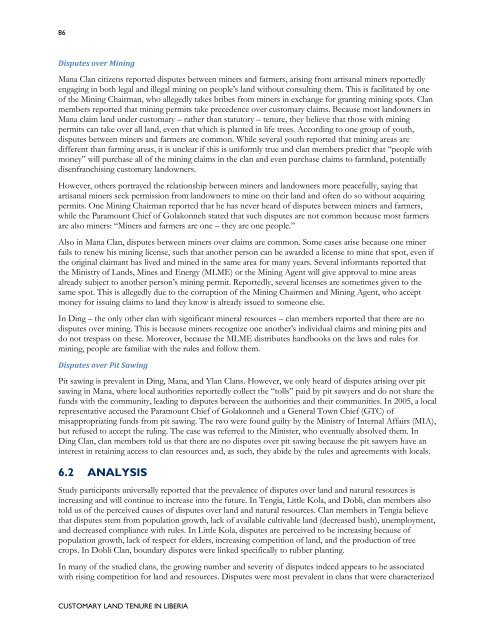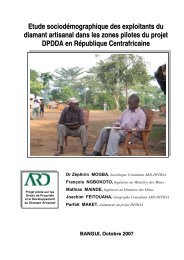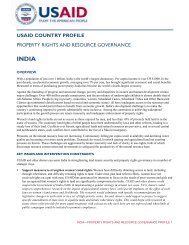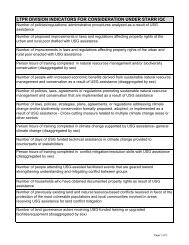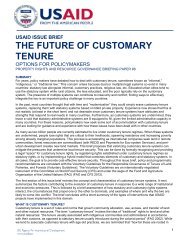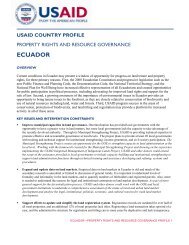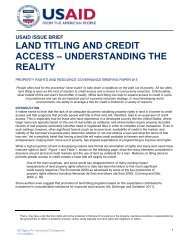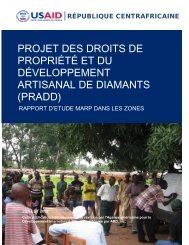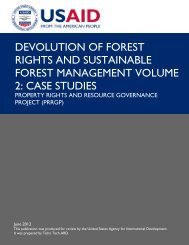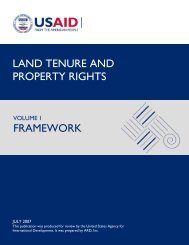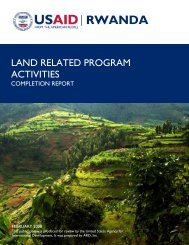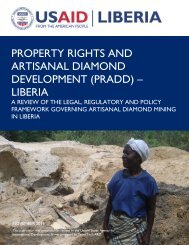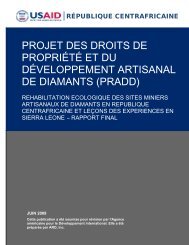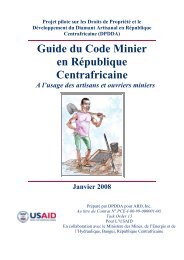Customary Land Tenure in Liberia - Land Tenure and Property ...
Customary Land Tenure in Liberia - Land Tenure and Property ...
Customary Land Tenure in Liberia - Land Tenure and Property ...
Create successful ePaper yourself
Turn your PDF publications into a flip-book with our unique Google optimized e-Paper software.
86<br />
Disputes over M<strong>in</strong><strong>in</strong>g<br />
Mana Clan citizens reported disputes between m<strong>in</strong>ers <strong>and</strong> farmers, aris<strong>in</strong>g from artisanal m<strong>in</strong>ers reportedly<br />
engag<strong>in</strong>g <strong>in</strong> both legal <strong>and</strong> illegal m<strong>in</strong><strong>in</strong>g on people‟s l<strong>and</strong> without consult<strong>in</strong>g them. This is facilitated by one<br />
of the M<strong>in</strong><strong>in</strong>g Chairman, who allegedly takes bribes from m<strong>in</strong>ers <strong>in</strong> exchange for grant<strong>in</strong>g m<strong>in</strong><strong>in</strong>g spots. Clan<br />
members reported that m<strong>in</strong><strong>in</strong>g permits take precedence over customary claims. Because most l<strong>and</strong>owners <strong>in</strong><br />
Mana claim l<strong>and</strong> under customary – rather than statutory – tenure, they believe that those with m<strong>in</strong><strong>in</strong>g<br />
permits can take over all l<strong>and</strong>, even that which is planted <strong>in</strong> life trees. Accord<strong>in</strong>g to one group of youth,<br />
disputes between m<strong>in</strong>ers <strong>and</strong> farmers are common. While several youth reported that m<strong>in</strong><strong>in</strong>g areas are<br />
different than farm<strong>in</strong>g areas, it is unclear if this is uniformly true <strong>and</strong> clan members predict that “people with<br />
money” will purchase all of the m<strong>in</strong><strong>in</strong>g claims <strong>in</strong> the clan <strong>and</strong> even purchase claims to farml<strong>and</strong>, potentially<br />
disenfranchis<strong>in</strong>g customary l<strong>and</strong>owners.<br />
However, others portrayed the relationship between m<strong>in</strong>ers <strong>and</strong> l<strong>and</strong>owners more peacefully, say<strong>in</strong>g that<br />
artisanal m<strong>in</strong>ers seek permission from l<strong>and</strong>owners to m<strong>in</strong>e on their l<strong>and</strong> <strong>and</strong> often do so without acquir<strong>in</strong>g<br />
permits. One M<strong>in</strong><strong>in</strong>g Chairman reported that he has never heard of disputes between m<strong>in</strong>ers <strong>and</strong> farmers,<br />
while the Paramount Chief of Golakonneh stated that such disputes are not common because most farmers<br />
are also m<strong>in</strong>ers: “M<strong>in</strong>ers <strong>and</strong> farmers are one – they are one people.”<br />
Also <strong>in</strong> Mana Clan, disputes between m<strong>in</strong>ers over claims are common. Some cases arise because one m<strong>in</strong>er<br />
fails to renew his m<strong>in</strong><strong>in</strong>g license, such that another person can be awarded a license to m<strong>in</strong>e that spot, even if<br />
the orig<strong>in</strong>al claimant has lived <strong>and</strong> m<strong>in</strong>ed <strong>in</strong> the same area for many years. Several <strong>in</strong>formants reported that<br />
the M<strong>in</strong>istry of <strong>L<strong>and</strong></strong>s, M<strong>in</strong>es <strong>and</strong> Energy (MLME) or the M<strong>in</strong><strong>in</strong>g Agent will give approval to m<strong>in</strong>e areas<br />
already subject to another person‟s m<strong>in</strong><strong>in</strong>g permit. Reportedly, several licenses are sometimes given to the<br />
same spot. This is allegedly due to the corruption of the M<strong>in</strong><strong>in</strong>g Chairmen <strong>and</strong> M<strong>in</strong><strong>in</strong>g Agent, who accept<br />
money for issu<strong>in</strong>g claims to l<strong>and</strong> they know is already issued to someone else.<br />
In D<strong>in</strong>g – the only other clan with significant m<strong>in</strong>eral resources – clan members reported that there are no<br />
disputes over m<strong>in</strong><strong>in</strong>g. This is because m<strong>in</strong>ers recognize one another‟s <strong>in</strong>dividual claims <strong>and</strong> m<strong>in</strong><strong>in</strong>g pits <strong>and</strong><br />
do not trespass on these. Moreover, because the MLME distributes h<strong>and</strong>books on the laws <strong>and</strong> rules for<br />
m<strong>in</strong><strong>in</strong>g, people are familiar with the rules <strong>and</strong> follow them.<br />
Disputes over Pit Saw<strong>in</strong>g<br />
Pit saw<strong>in</strong>g is prevalent <strong>in</strong> D<strong>in</strong>g, Mana, <strong>and</strong> Ylan Clans. However, we only heard of disputes aris<strong>in</strong>g over pit<br />
saw<strong>in</strong>g <strong>in</strong> Mana, where local authorities reportedly collect the “tolls” paid by pit sawyers <strong>and</strong> do not share the<br />
funds with the community, lead<strong>in</strong>g to disputes between the authorities <strong>and</strong> their communities. In 2005, a local<br />
representative accused the Paramount Chief of Golakonneh <strong>and</strong> a General Town Chief (GTC) of<br />
misappropriat<strong>in</strong>g funds from pit saw<strong>in</strong>g. The two were found guilty by the M<strong>in</strong>istry of Internal Affairs (MIA),<br />
but refused to accept the rul<strong>in</strong>g. The case was referred to the M<strong>in</strong>ister, who eventually absolved them. In<br />
D<strong>in</strong>g Clan, clan members told us that there are no disputes over pit saw<strong>in</strong>g because the pit sawyers have an<br />
<strong>in</strong>terest <strong>in</strong> reta<strong>in</strong><strong>in</strong>g access to clan resources <strong>and</strong>, as such, they abide by the rules <strong>and</strong> agreements with locals.<br />
6.2 ANALYSIS<br />
Study participants universally reported that the prevalence of disputes over l<strong>and</strong> <strong>and</strong> natural resources is<br />
<strong>in</strong>creas<strong>in</strong>g <strong>and</strong> will cont<strong>in</strong>ue to <strong>in</strong>crease <strong>in</strong>to the future. In Tengia, Little Kola, <strong>and</strong> Dobli, clan members also<br />
told us of the perceived causes of disputes over l<strong>and</strong> <strong>and</strong> natural resources. Clan members <strong>in</strong> Tengia believe<br />
that disputes stem from population growth, lack of available cultivable l<strong>and</strong> (decreased bush), unemployment,<br />
<strong>and</strong> decreased compliance with rules. In Little Kola, disputes are perceived to be <strong>in</strong>creas<strong>in</strong>g because of<br />
population growth, lack of respect for elders, <strong>in</strong>creas<strong>in</strong>g competition of l<strong>and</strong>, <strong>and</strong> the production of tree<br />
crops. In Dobli Clan, boundary disputes were l<strong>in</strong>ked specifically to rubber plant<strong>in</strong>g.<br />
In many of the studied clans, the grow<strong>in</strong>g number <strong>and</strong> severity of disputes <strong>in</strong>deed appears to be associated<br />
with ris<strong>in</strong>g competition for l<strong>and</strong> <strong>and</strong> resources. Disputes were most prevalent <strong>in</strong> clans that were characterized<br />
CUSTOMARY LAND TENURE IN LIBERIA


